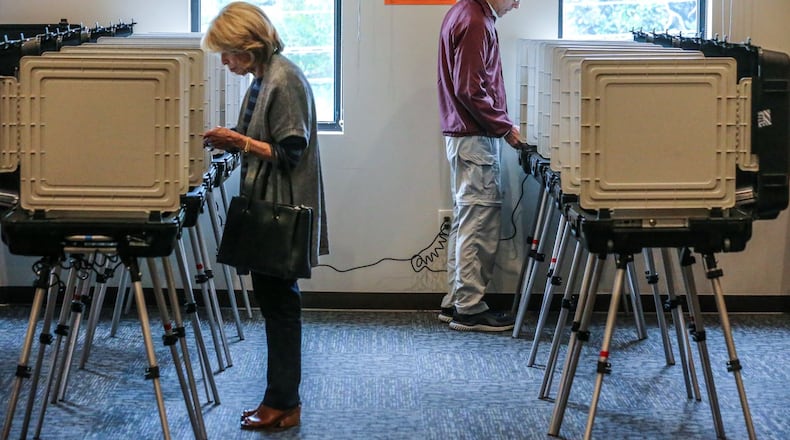Over the years, Georgia has seen its fair share of politicians that go by distinctive names, from James H. “Sloppy” Floyd to James “Bubber” Epps. But a current race in DeKalb County reignited a discussion over the legality — and legitimacy — of nicknames on the ballot.
In the crowded special election for DeKalb sheriff, two hopefuls qualified to run using nicknames as their middle names. Ruth "The Truth" Stringer, a former sheriff's office major who has served as interim sheriff, and Antonio "Block" Johnson, the former marshal of Fulton County, are set to face off against seven others in the March 24 election.
Both Stringer and Johnson said friends and peers in the community call them by those monikers. But they drew the attention of the county elections board at its most recent meeting.
The five-member board got a crash course in state law related to informal titles on the ballot. Candidates cannot list titles like military rank, “Dr.,” “Rev.” or “Judge,” but they are allowed to include nicknames by which they are “commonly known in the community,” according to the secretary of state’s office.
Credit: Alyssa Pointer
Credit: Alyssa Pointer
However — and this is the key provision — those names can’t include a “spurious” phrase or “political slogan or message.” That means “John ‘Johnny’ Doe” would likely be alright. “John ‘Vote for Me’ Doe”? Probably not.
State officials wanted the DeKalb elections board to determine whether “The Truth” was more of a political message than an actual nickname.
“I received a call from the secretary of state’s office,” DeKalb elections director Erica Hamilton said at the meeting earlier this month. “I recommend that we remove ‘The Truth’ and just have her as ‘Ruth Stringer’ on the ballot.”
Stringer addressed the board and said she received the nickname “Truth” while serving in the U.S. Marine Corps 30 years ago.
“A general gave me that name, so it has nothing to do with this election,” she said, adding that people still call her by that name. “It’s not political for me.”
Credit: Courtesy
Credit: Courtesy
Johnson, who was not at the meeting, said in an interview this week that he got the nickname from his family when he was 5 years old and a big fan of Peanuts cartoon character Charlie Brown, AKA "blockhead."
“I used to watch it so much, so they started calling me “Block,’” he said, adding that it’s how he’s commonly known in the law enforcement community. He said not having the nickname on the ballot might hurt his chances of name recognition with voters.
“If they got to the ballot box and they just see ‘Antonio Johnson’ … most people don’t know my first name,” he said.
During the meeting, Hamilton pointed out that voters are used to seeing unique nicknames in politics; she brought up “Able” Mable Thomas, a longtime state representative from Atlanta.
Thomas has been cleared to use "Able" as her nickname on the ballot, according to a spokesman for the secretary of state, who pointed out that the state's elections division is located in the "Sloppy Floyd Building," named after the late state representative who said he got the nickname in high school and used it the rest of his life.
In Cobb County, there's Steve "Thunder" Tumlin, the current mayor of Marietta and a former state representative. He used the nickname on the ballot when running for reelection in 2013; he has said he got the nickname as an infant, when his older sister thought his squalling sounded like thunder.
Credit: Courtesy
Credit: Courtesy
And of course, this isn't just a Georgia thing. A well-known judge and former Mississippi state representative in the mid-1950s went by "Soggy" Sweat. In last fall's elections in Louisiana, candidates' nicknames included Ralph "Rem" Brandt, "Jeff Big Daddy" Naquin, Joseph "Mr. Me" Oliver Jr. and Aaron "The Fixer" Staten, according to WAFB 9News in Baton Rouge.
Other infamous nicknames have been more explicitly political. Byron Looper, a candidate for tax assessor in Putnam County, Tennessee in 1996, had his middle name legally changed from "Anthony" to "(Low Tax)" to get his political message across on the ballot, according to The New York Times. He had moved to Tennessee after running unsuccessfully for the Georgia House eight years earlier. Looper, however, is perhaps more widely known for being convicted of murdering his opponent in a race for state Senate in 1998 just weeks before the election. He died in prison in 2013, the Chattanooga Times Free Press reported.
In the (much less controversial) race for DeKalb County sheriff, Stringer brought up to the elections board that Johnson was allowed to use “Block” as his nickname. Hamilton said the secretary of state’s office only asked the board to review Stringer’s nickname, but other officials said it was important to have even standards for candidates’ nicknames.
“I just think we need to be consistent,” said Dele Lowman Smith, one of the elections board members.
The officials ultimately decided that Stringer’s explanation for her nickname was sufficient, and ruled that DeKalb voters will see both “The Truth” and “Block” on the March 24 ballot.
“I think that the board was fair with their decision,” Stringer said in an interview last week. “You can’t treat one candidate differently than you treat the others.”
Follow DeKalb County News on Facebook and Twitter
Wouldn’t you like to support our strong journalism? Your subscription helps us cover your communities in a way that no one else can. Visit https://subscribe.ajc.com/hyperlocal or call 404-526-7988 to begin or renew your subscription.
About the Author
Keep Reading
The Latest
Featured





